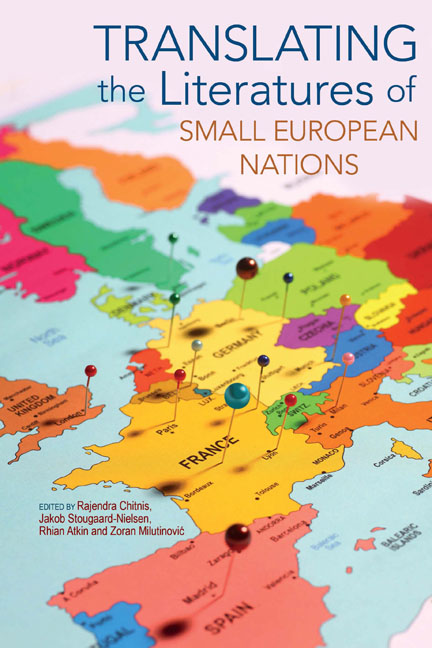Book contents
- Frontmatter
- Contents
- Acknowledgements
- Introduction
- 1 The Global Presentation of Small National Literatures: South Slavs in Literary History and Theory
- 2 Translators as Ambassadors and Gatekeepers: The Case of South Slav Literature
- 3 Supply-driven Translation: Compensating for Lack of Demand
- 4 Literature as Cultural Diplomacy: Czech Literature in Great Britain, 1918–38
- 5 Exporting the Canon: The Mixed Experience of the Dutch Bibliotheca Neerlandica
- 6 Creative Autonomy and Institutional Support in Contemporary Slovene Literature
- 7 Strategies for Success? Evaluating the Rise of Catalan Literature
- 8 Gender, Genre and Nation: Nineteenth-century Swedish Women Writers on Export
- 9 Translating as Re-telling: On the English Proliferation of C.P. Cavafy
- 10 Criminal Peripheries: The Globalization of Scandinavian Crime Fiction and Its Agents
- 11 Literary Translation and Digital Culture: The Transmedial Breakthrough of Poland's The Witcher
- 12 Towards a Multilingual Poetics: Self-translation, Translingualism and Maltese Literature
- 13 Does Size Matter? Questioning Methods for the Study of ‘Small’
- Coda: When Small is Big and Big is Small
- Index
7 - Strategies for Success? Evaluating the Rise of Catalan Literature
- Frontmatter
- Contents
- Acknowledgements
- Introduction
- 1 The Global Presentation of Small National Literatures: South Slavs in Literary History and Theory
- 2 Translators as Ambassadors and Gatekeepers: The Case of South Slav Literature
- 3 Supply-driven Translation: Compensating for Lack of Demand
- 4 Literature as Cultural Diplomacy: Czech Literature in Great Britain, 1918–38
- 5 Exporting the Canon: The Mixed Experience of the Dutch Bibliotheca Neerlandica
- 6 Creative Autonomy and Institutional Support in Contemporary Slovene Literature
- 7 Strategies for Success? Evaluating the Rise of Catalan Literature
- 8 Gender, Genre and Nation: Nineteenth-century Swedish Women Writers on Export
- 9 Translating as Re-telling: On the English Proliferation of C.P. Cavafy
- 10 Criminal Peripheries: The Globalization of Scandinavian Crime Fiction and Its Agents
- 11 Literary Translation and Digital Culture: The Transmedial Breakthrough of Poland's The Witcher
- 12 Towards a Multilingual Poetics: Self-translation, Translingualism and Maltese Literature
- 13 Does Size Matter? Questioning Methods for the Study of ‘Small’
- Coda: When Small is Big and Big is Small
- Index
Summary
Many literatures, not just those of smaller nations, aim to have works translated into languages of supposed prestige. Commenting on the Prix Formentor initiative from the 1960s, George Weidenfeld (the deceased Lord Weidenfeld) said that ‘For an Italian book to become known internationally, it had to pass through the filter of English publishing’ and ‘Italian publishers were well aware of this fact’ (de Glas, 2013, 172). The Englishlanguage market is renowned, however, for its resistance to translation, often expressed through the mythical claim that 3 per cent of books published in the UK and US are translations. Venuti (2008, 11) places this figure between 2 and 4 per cent, Nielsen at 3.5 per cent (Booker Prizes, 2016), and Literature across Frontiers’ research says that the 3 per cent figure seems true for all books, but translated literature is consistently above 4 per cent (Büchler and Trentacosti, 2015, 5). There is also anecdotal evidence that UK and US publishers are simply not interested in foreign works: ‘“The English buy nothing except American products. As for Americans, they are only interested in themselves, that's all,” says the female literary director of a large [French] house’ (Bourdieu, 2008, 151). This, then, is a Catch-22 situation: English-language markets are key to wider international success, but are very difficult to enter. And if this is difficult for better-known foreign literatures, it proves even more so for smaller literatures. In this chapter, I shall analyse how a small European literature (Catalan) might reach an English-language audience, and how many books actually make it through. In this context, I shall discuss what ‘small’ means in the market for English-language translated literature, and why ‘small’ does not have to be a synonym for a lack of commercial success.
Catalan as a Literature of a Small European Nation
Catalan presents many of the difficulties encountered when trying to classify a language, literature or culture as ‘small’ or ‘minority’. Catalan is a language spoken by some 8.5 million people and understood by 12 million, mostly in the autonomous communities of Catalonia, Valencia and the Balearic Islands in Spain, the area of Southern France known to the Catalans as ‘Northern Catalonia’, and the city of Alghero in Sardinia. It is also the sole official language of the Pyrenean state of Andorra, so it is technically not a stateless language.
- Type
- Chapter
- Information
- Translating the Literatures of Small European Nations , pp. 126 - 144Publisher: Liverpool University PressPrint publication year: 2019



